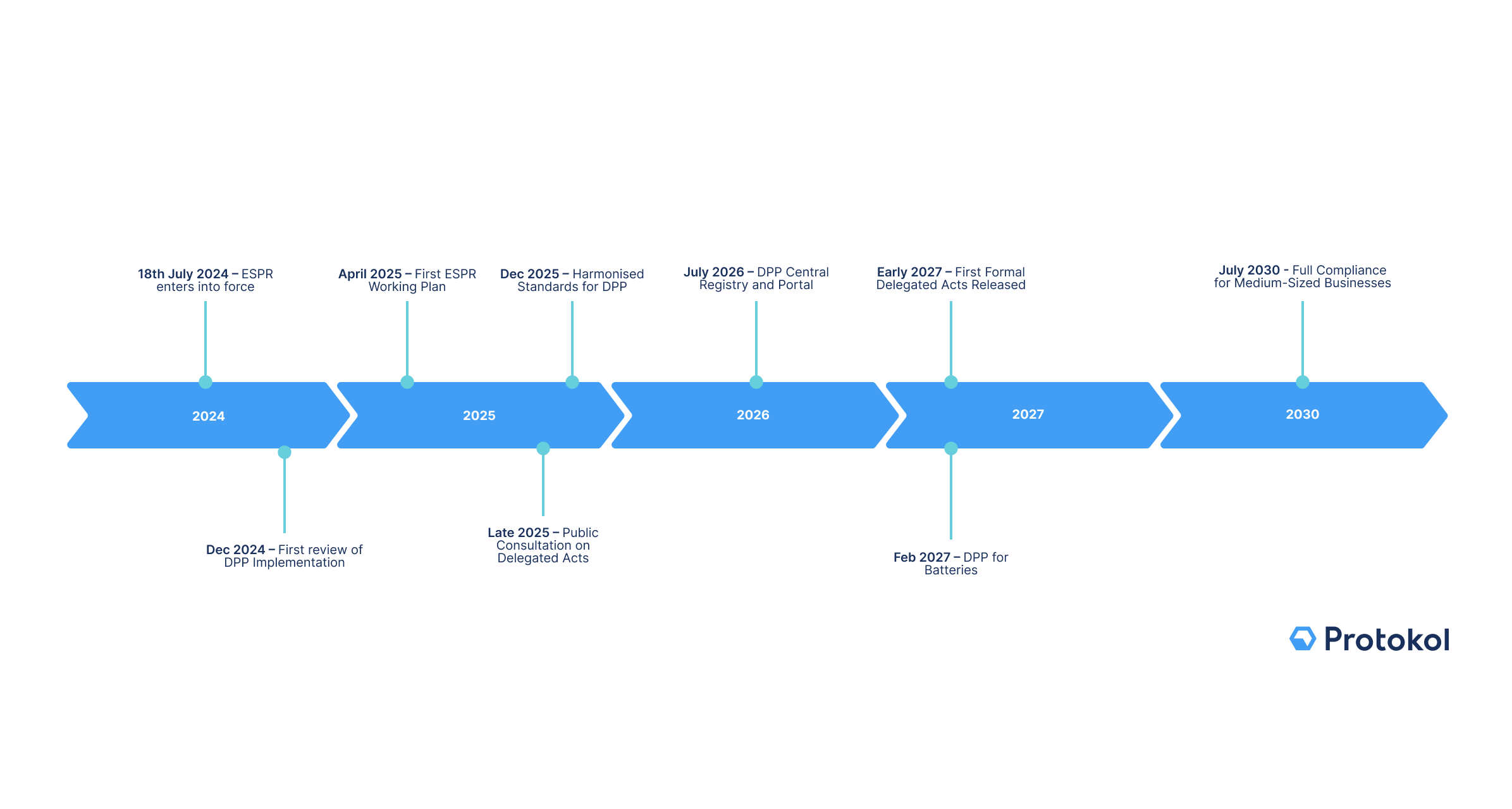The Ecodesign for Sustainable Products Regulation (ESPR), officially entering into law on 18th July 2024, is a key pillar of the EU’s Circular Economy Action Plan (CEAP) and broader European Green Deal – a strategy that hopes to turn the EU into a carbon-neutral economy by 2050.
Building on its predecessor, the Ecodesign Directive 2009/125/EC, the Ecodesign for Sustainable Products Regulation goes further to tackle the issue of unsustainable products entering the EU market by enforcing a framework for setting ecodesign requirements for a multitude of product groups.
One of the core initiatives within the ESPR is that all organisations in industries that fall within the scope of the legislation must implement Digital Product Passports (DPPs) by 2030, with some mandated to introduce DPPs as early as 2027.
Background – Ecodesign Directive 2009/125/EC
The previous Ecodesign Directive, introduced in 2009, was a framework directive designed primarily to reduce energy use by a certain set of product groups – mainly electrical products that run energy-intensive processes such as boilers, food preparation equipment, and sound/imaging apparatus.
As a framework directive, the 2009 Ecodesign Directive didn’t directly set minimum legal ecological requirements for products. Those were set on a case-by-case basis for individual product groups covered by the scope of the directive using a set of implementing acts.
This meant that manufacturers wishing to sell products across the EU covered by the directive would need to remain abreast of the specific implementing act and the rules it places on their products.
In March 2022, the European Commission published a proposal for a new regulation that would expand upon, and ultimately replace, the Ecodesign Directive 2009 – named the Ecodesign Directive for Sustainable Products Regulation (ESPR).
What is the Ecodesign for Sustainable Product Regulation (ESPR)?
The EU’s Circular Economy Action Plan (CEAP) was adopted in March 2020, and aims to address consumption and waste across the region.
As part of the CEAP and replacing the Ecodesign Directive 2009/125/EC, the Ecodesign for Sustainable Products Regulation (ESPR), brought into force on the 18th of July 2024, is a wide-ranging piece of legislation that establishes sustainable design requirements for physical products entering the EU market.
The ESPR extends the coverage and scope of the previous requirements to include a broad spectrum of products from a range of industries to improve product circularity and sustainability.
It applies to physical products manufactured and sold on the EU market, including those manufactured outside the EU. This means that organisations with supply chains extending to other parts of the globe are not automatically outside the legislative scope.
The legislative scope is not limited solely to product manufacturers. It relates to the entire value chain of a business, including retailers and distributors on the sales side, for example, and waste management and recycling companies on the end-of-life side of the product lifecycle.
The ESPR highlights an initial group of 33 product categories across several industry segments to lead the way for the legislation, with 18 of those selected as having high potential to reduce environmental impacts.
End-user product categories highlighted include:
- Textiles and Footwear
- Furniture
- Tyres
- Bed Mattresses
- Detergents
- Paints and Varnishes
- Lubricants
- Cosmetics
- Toys
- Fishing Gears
- Absorbent Hygiene Products
Intermediate product categories highlighted include:
- Iron and Steel
- Commodity Chemicals
- Non-Ferrous, Non-Aluminium Metal Products
- Aluminium
- Plastic and Polymers
- Pulp and Paper
- Glass
These initial product groups have been identified as high-priority due to the significant adverse impact that producing and disposing of their goods can have on the environment. Further industries are due to follow suit over time, and industry-specific ecodesign requirements will be codified into the new law via delegated acts.
Energy Labelling Regulation
In conjunction with the Ecodesign for Sustainable Products Regulation (ESPR), the Energy Labelling Regulation sets requirements for energy-related products to be accurately labelled according to their energy efficiency for the purpose of consumer comparison.
First established under EU Directive 92/75/EC (1992), the directive was replaced twice, with Regulation 2017/1369/EU eventually being ratified in August 2017 with an implementation date set for 2021.
This was updated to include a simplified energy labelling scale that rated the product’s energy efficiency from A to G and green to red (A Green being the most efficient, G Red being the least) to replace the original labelling criteria.
The European Product Registry for Energy Labelling (EPREL) was launched in 2022, allowing consumers to compare the energy efficiency classes of different products.
Alongside the new ecodesign requirements set out in the ESPR, both regulations help empower customers with a product’s full environmental impact profile, promoting eco-conscious purchase and usage, and helping the EU achieve its circular economy goals. You can find a detailed Ecodesign and Energy Labelling Working Plan (2022) here.
ESPR Timeline

While the ESPR has been ratified and entered into force on 18th July 2024, there are several key milestones that have been laid out by the European Commission for the coming years.
In December 2024, there was a first review of DPP implementation to provide feedback from industry bodies before releasing the first delegated acts.
In the first half of 2025, the first ESPR Working Plan is due to be adopted, setting out in detail the products that are due to be prioritised by the legislation over the next few years, followed by the development of product rules, impact assessments, and stakeholder consultation.
Later in 2025, there is expected to be a public consultation on the ESPR’s Delegated Acts, the series of acts that will govern the requirements for the priority product groups.
One of the key milestones to be aware of is December 2025, when the harmonised standards for Digital Product Passports are due to be released. This will define the technical standards and scope of these key pieces of infrastructure in line with CEN/CENELEC standards.
July 2026 is set to see the establishment of a centralised DPP registry and portal to enable tracking and data access.
The first formal delegated acts are due to be released for key sectors such as Textiles, Steel, and Furniture in Early 2027, followed by the official implementation deadline for the Batteries industry in February of the same year.
Finally, the full compliance deadline for large and medium-sized businesses to comply with all ESPR and DPP-related requirements is set for 2030.
What are the ESPR’s sustainability criteria?
The goal of the ESPR is to set minimum ecodesign requirements for products manufactured or sold within the EU (in various product categories). It sets the minimum ecodesign requirements for the following product attributes:
1. Durability
- Products must be designed for longer lifespans to reduce waste.
- Specific numerical targets for durability will be defined in delegated acts for each product group (e.g., textiles, electronics).
2. Reusability
- Products must be designed to be used more than once.
- Adequate usage information to be provided to end users to promote reuse.
3. Recyclability and Recycled Content
- Packaging products must include at least 25% recycled plastic by 2025, increasing to 30% by 2030.
- Electronics and textiles are expected to meet specific recycled content thresholds, as outlined in the EU’s Circular Economy Action Plan.
4. Upgradability
- Products should be built to be able to be upgraded with new components when they become available
- Help to end the practice of planned obsolescence
5. Reparability
- Improved capacity for end users to repair products easily, or send them back for repair efficiently
6. Resource efficiency
- Reduce waste within the manufacturing process
- Utilise fewer rare earth minerals and other scarce resources in production
7. Energy efficiency
- Targets for reduced energy consumption are a continuation of existing goals under the Ecodesign Directive (2009/125/EC), such as:
- Household appliances achieved annual energy savings of 230 million tons of oil equivalent (Mtoe) by 2020.
- Future ESPR delegated acts will expand these targets to include ICT and other products.
8. Reduction of Hazardous Substances
- The regulation aligns with existing REACH standards to reduce hazardous chemicals that hinder circularity.
Example of Sustainable Product Requirements – Mobile Phones and Tablets
One of the first concrete examples of specific ecodesign requirements have been published for the Mobile Phones and Tablets product category.
Applying from 20th June 2025 onwards, the following ecodesign requirements will apply for smartphones, feature phones, cordless phones, and slate tablets placed on the EU market:
- resistance to accidental drops or scratches and protection from dust and water
- sufficiently durable batteries which can withstand at least 800 charge and discharge cycles while retaining at least 80% of their initial capacity
- rules on disassembly and repair, including obligations for producers to make critical spare parts available within 5-10 working days, and for 7 years after the end of sales of the product model on the EU market
- availability of operating system upgrades for longer periods (at least 5 years from the date of the end of placement on the market of the last unit of a product model)
- non-discriminatory access for professional repairers to any software or firmware needed for the replacement
These products will also need to sufficiently display information about their energy efficiency and battery longevity, as well as display a reparability score.
This information will help EU customers to make more informed, eco-conscious purchase decisions. Organisations can expect to see similarly specific ecodesign requirements for the rest of the product categories regulated under the ESPR.
Destruction of Unsold Goods Ban
The ESPR introduces a direct ban on the destruction of unsold and returned products, as that practice wastes valuable resources unnecessarily. This ban will occur from 2026 for large enterprises and 2030 for SMEs.
The ban mainly pertains to the destruction of unsold textiles and footwear but bans on products from other categories may follow if the measures prove to be effective. Large businesses are also required to disclose the amount of unsold products annually on their website, along with the reason for discarding them.
Green Procurement
Mandatory rules are set by the ESPR on product procurement practices for specific products.
Public entities that purchase products will be required to purchase only products that meet the highest levels of sustainability and circularity performance and to prove that procurement contracts issued to private companies meet strict the guidelines set out in 2014/24/EU and 2014/25/EU.
The combination of all these requirements will help the EU achieve its circularity goals, such as doubling its circular material use rate by 2030 from the current levels – 11.5% in 2022. To support the implementation of these strengthened sustainability criteria, the ESPR mandates the use of Digital Product Passports for all regulated products.
What are Digital Product Passports (DPPs)?
Digital Product Passports are a mechanism for sharing critical product data throughout the product’s lifecycle.
Via a data carrier, such as a QR code, RFID tag, or NFC technology, DPPs can be attached to physical products to give a holistic view of their lifecycle from manufacture to sale, through their eventual recycling, resale and beyond.
DPPs can carry various types of data, including:
- Raw Material Composition
- Manufacturing Information
- Supply Chain Journey
- Sustainability/Carbon Footprint
- Recyclability
- Ownership
- Warranties
This data is to be structured to meet the needs of regulators and for businesses to use practically to increase the overall sustainability of their operations. Designed for interoperability, DPPs will be required to integrate into existing databases and digital systems.
Giving stakeholders reliable access to this data can drive sustainable consumer decision-making, maximise product recyclability, and encourage circular economy principles, making DPPs one of the core drivers of the ESPR.
The ESPR requires the information contained within DPPs to be transparent and verifiable. This revolutionary system of information sharing will form the foundation for proving compliance with the ESPR, whilst simultaneously helping organisations to comply with other sustainability directives, such as the CSRD.
Who does the ESPR affect?
A wide-ranging piece of legislation, the Ecodesign for Sustainable Products Regulation affects many organisations directly, as well as the businesses that comprise their value chain, provided that the products the organisation manufactures are being manufactured or sold in the EU.
This can include retailers, wholesalers, manufacturers, distributors, service providers, and recycling companies, no matter where they operate within the global trade network. The ESPR also covers many intermediate products, such as steel and concrete, adding an extra layer of complexity to industries such as construction.
Products that meet the ecodesign requirements set out within the ESPR benefit from a sort of ‘free movement’ protection in which EU member states are prohibited from restricting that product from being sold on their market, incentivising organisations to make their products compliant.
Small to Medium Enterprises
Whilst the ESPR is broad in scope, it recognises that its requirements may be more difficult to implement for SMEs as opposed to larger organisations.
Article 19 of the ESPR states that Member States and the European Commission must undertake several measures to help SMEs attain compliance with the legislation, including specific guidelines, financial assistance, and training. This will be achieved using supplementary acts.
Exemptions
While the Ecodesign for Sustainable Product Regulation covers a great many product categories, there are some exceptions. For example, food products, animal feed, and certain medical products will not require compliance with the ESPR (they may still be covered under other related pieces of legislation).
How can businesses prepare?
In order to prepare for implementing Digital Product Passports and for ESPR compliance as a whole, organisations must take several key steps.
Firstly, organisations must map out their value chain and data sources. Much of the data that is required by DPPs will not be available internally but from suppliers, manufacturers and other stakeholders.
Engaging internal and external stakeholders will be key to unlocking the necessary levels of collaboration, both within your organisation and throughout the value chain, to ensure a successful DPP integration that complies with the ESPR.
Organisations must then proceed to develop the necessary digital infrastructure to collect, manage, and share product data, aligning with the standards set out within the legislation itself. To help ensure that this whole process goes smoothly, organisations should engage with a Digital Product Passport Consulting partner and Digital Product Passport Solution provider.





